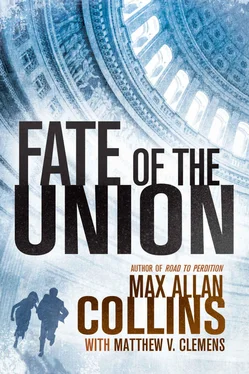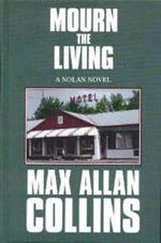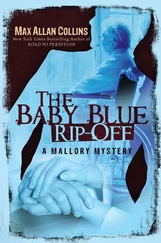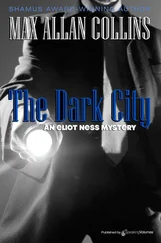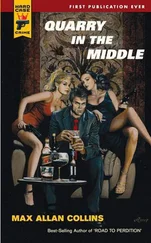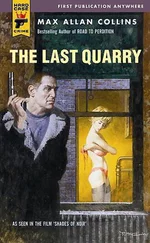Uniformed police were moving quickly down the aisles now. Soon FBI and Homeland Security agents would descend on Constitution Hall. Rogers stood guard over the dead security man while Reeder went over to where the sandy-haired shooter lay dead as hell on his side, a mere trickle of red out the puncture of a forehead entry wound, while the larger exit wound had puked blood, brains, and bone onto the stage.
Reeder knelt and had a closer look at the man’s face — no, this was not Bryson’s blond, but could possibly be the attacker from the security office. He pulled back the man’s shirt and jacket cuffs, both arms — no Special Forces tattoo. So this wasn’t the man recorded on the Skyway Farer motel security cam.
So who was the man who wanted Adam Benjamin dead?
Elmore was coming over to him again. Reeder stood and met him halfway, near the bullet-pocked podium. Rogers came over and fell in at Reeder’s side, two DC uniformed men huddling around the fallen Akers now.
“Thanks to the two of you,” Elmore said, as if he were reporting the weather, “Adam Benjamin is alive and well.”
Rogers said, “Just doing my job.”
Reeder said, “Instinct kicks in. You know.”
“Mr. Benjamin would very much like to thank you both personally.”
Rogers said, “That won’t be necessary,” just as Reeder was saying, “No need.”
“He’s quite insistent.”
Bohannon and Wade, from Rogers’s team, were coming swiftly down an aisle. Just behind them, trench coat flapping, came DC homicide detective Pete Woods.
Reeder asked Elmore, “Where is Mr. Benjamin?”
“Heading back to the hotel.”
“What hotel?”
“The Holiday Inn Express in Falls Church, of course.”
Rogers gave Reeder a wide-eyed, you-gotta-be-kidding-me look. He shrugged.
Elmore was saying, “We can arrange a limo for you.”
Detective Woods, approaching, overheard that and said, a little louder than necessary, “Mr. Reeder and Ms. Rogers won’t be needing a limo tonight! We’ll be having conversations with them that may last some time.”
Reeder gave Elmore a shrug. “You’ll have to convey our regrets.”
The majordomo nodded curtly, then disappeared into the wings.
Reeder said to Woods, “Let’s have a look at our dead would-be assassin.”
Woods didn’t argue as Reeder led the way, Rogers falling in behind the homicide detective, perhaps not eager for a closer look at the man she’d killed.
“Watch your step,” Reeder said. “Little messy right over there — see it?”
Woods looked a little pale around the gills. Homicide man or not, he was still new to the job.
Reeder knelt near the corpse and Woods crouched near Reeder, who said, “This isn’t the blond from the SIM card. Agreed?”
“Agreed.”
“By the build, it might be the guy I mixed it up with at Bryson’s, so it could also make him your uniformed officer’s killer. Might even be one of the guys who murdered Chris.”
Woods frowned at Reeder. “‘One of the guys’?”
“Detective, Chris Bryson could handle himself — former Secret Service agent, armed, not a small man. Our failed assassin here, all by himself, could hardly incapacitate Bryson and hang him with his own belt.”
Opposite them, Bohannon had squatted next to the shooter; with a latex-gloved hand, he pressed the dead man’s thumb to his smartphone screen, utilizing its fingerprint ID app. A moment later, the screen displayed the results.
Bohannon said, “Thomas Louis Stanton.” He scrolled through a few screens. “At first glance? A solid citizen... until tonight.”
Rogers asked, “Prints on file because of military service?”
“Yep. Honorable discharge twenty years ago.”
She frowned. “How does a ‘solid citizen’ turn into a political assassin?”
Bohannon gave her half a smile and said, “This app just does fingerprints.”
Over the next twenty-four hours, they would surely come to know Thomas Louis Stanton inside and out. For now, though, Reeder and Rogers had hours ahead of them of police interviews, and after that FBI debriefings.
But it could be worse. It was a bad night to be a rank-and-file cop. This had been a hall filled with up to 3,500 eye witnesses, many of whom had beat it out before the boys in blue showed, though enough remained that a staggering number of names would need collecting for later interviews. And all of that news footage would have to be collected and looked at closely.
“Shit,” Reeder said, aloud, something occurring to him, then turned to Rogers. “I have to call Amy and tell her I’m all right.”
“Did your daughter know you were going to be at the event tonight?”
He put a hand on his forehead as if he were taking his own temperature. “No, but this is going to hit the news and is probably already all over the net. Don’t you think those TV crews uploaded everything they caught right on the spot, before the cops could seize it?”
Rogers grinned. “Amy’s the least of your worries.”
“What do you mean?”
“Those cameras caught you throwing yourself on Adam Benjamin, ready to take another bullet for a great man. Joe Reeder, welcome back to the twenty-four-hour news cycle — you’re a hero again.”
“Shit,” he said.
“All of us might wish at times that we lived in a more tranquil world, but we don’t.
And if our times are difficult and perplexing, so are they challenging and filled with opportunity.”
Robert F. Kennedy, 64th Attorney General of the United States, Senator from New York, 1965–1968. Section 45, Grid U-33.5, Arlington National Cemetery.
Patti Rogers had expected to be answering questions for hours either at Convention Hall or DC Homicide, but that changed in a hurry when — on the phone she’d just rescued from her bloody jacket — she got a call from the Director himself.
“Special Agent Rogers,” came the deep rasp of a man she’d rarely spoken to, much less seen, “you need to report here to Assistant Director Fisk as soon as possible.”
She swallowed. “Sir, at this juncture, this is not our investigation. Detective Peter Woods from DC Homicide is on the scene, as are several of his men.”
“Put him on the phone.”
She was still near the fallen Akers; Woods with Reeder and Bohannon were across the stage by the dead shooter. Uniformed men swarmed the hall, but right now the stage itself was limited to a handful of law enforcement officers — and Reeder, of course.
She summoned Woods with a flip of her fingers and he frowned but came over.
“What?”
“Not what,” Rogers said. “ Who — the Director of the Federal Bureau of Investigation.”
The young cop’s eyebrows went up and he took the cell and said, “Detective Peter Woods, sir.”
Soon Agents Wade and Bohannon were leading Woods, Reeder, and Rogers (backed up by several uniformed men) through the wings. No sign of Benjamin and his people, who by all rights should have stayed but essentially took advantage of the confusion to leave before anything official kicked in.
They were whisked past dressing rooms, stage gear, backstage crew (herded by two uniformed cops), and out a rear door into a waiting black SUV, which the Director had apparently dispatched before Rogers had even been called. The driver, a solemn male agent she didn’t recognize, gunned the vehicle and they sped away from Constitution Hall. The interior of the vehicle was almost as cold as outside — heater hadn’t even had the chance to warm up yet.
An incident like this, so close to the White House, meant the entire DC area was heading into lockdown. The chance that any media could follow them was fairly remote — those in attendance were being held at the hall — and, anyway, the driver was rocketing through city streets with blue and red lights flashing.
Читать дальше
